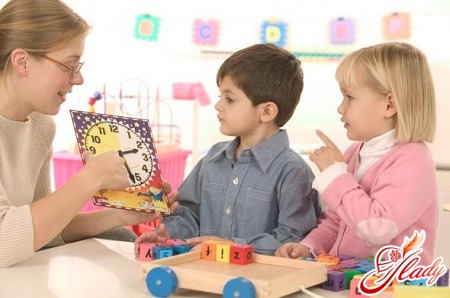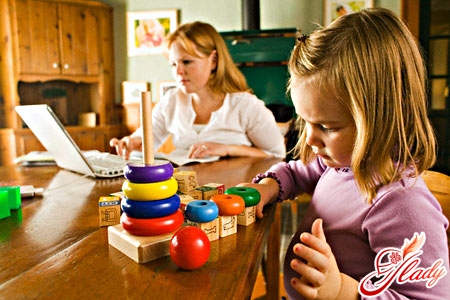 A smart, healthy and successful child who knowsThe answer to any question from adults is the dream of every loving mother. But what to do if your child gets only C's at school, and it takes you and him more than one hour to learn quatrains? There is no need to panic and punish the student for his inattention and mistakes, it is necessary to develop his memory.
A smart, healthy and successful child who knowsThe answer to any question from adults is the dream of every loving mother. But what to do if your child gets only C's at school, and it takes you and him more than one hour to learn quatrains? There is no need to panic and punish the student for his inattention and mistakes, it is necessary to develop his memory.
Seven Reasons for Bad Memory
- Extraneous stimuli
In fact, parents rarely think about this,in what conditions their children do their homework. A computer, a bright toy above the table, a TV – all of this distracts and prevents them from concentrating on the most important thing – lessons. Try to organize your child’s workplace correctly: a minimum of things, a maximum of space.
- Hunger or overeating
As soon as the schoolchild returns home, the first thingfeed him. By the way, you can't force the baby to sit down to do homework immediately after eating, since the tired and satiated body needs to rest for at least an hour. Also, you shouldn't starve the child, even if the family observes Lent or you are trying to punish him by depriving him of lunch or dinner. After all, the development and functioning of the brain requires nutrients, microelements and vitamins, without which it is impossible to develop memory in principle. Do not forget to control school meals, and every day ask the child what he was fed, how much he ate, whether he liked the dishes. In the future, you can either give money for buns, or make sandwiches, buy fruits, chocolate. Of course, dry rations are not very useful, but it is naive to think that an already grown-up eighth-grader will buy the first, second and compote. Usually, high school students are embarrassed to order a full lunch, and you are unlikely to be able to influence this situation. The schoolchild's diet should be as follows: for breakfast - porridge with vegetable salad, for lunch - borscht or soup, for dinner - mashed potatoes or pasta with meat. Every two hours it is recommended to give him yogurt, kefir, cottage cheese, fruits, vegetables so that the stomach constantly works, and does not eat itself.
- Boring jobs
Even an adult finds it difficult to rememberboring, uninteresting information that cannot be applied in practice. In elementary grades, it is recommended to do homework with the child, and everything should be done in a playful manner. If you sit him at the table and go off on business, then most likely, twenty to thirty minutes later you will find the child drawing in a notebook.
- Wrong Approach
You yell at him to rewrite it for the hundredth time.once a rule that he can't remember? Perhaps your child has a phenomenal auditory memory and you should have read those unfortunate couple of lines once so that he would learn everything by heart. But you stubbornly force him to do something that won't help him, and you are angry with him. Next time, try to experiment: ask him to repeat after you, and also tell him to read not only to himself, but also out loud. By the way, it is very useful to tell your baby fairy tales and put on records with recordings from birth. In this way, you develop imaginative thinking, which will be useful to him in the future. But you shouldn't turn on the TV so that the child does not interfere with doing household chores.
- Lack of sleep
It's bad if a schoolchild sits all the time in the eveningsat the computer and goes to bed later than ten or eleven o'clock. After all, the memory of both adults and children directly depends on the state they are in at the moment. Remember how difficult it is for you to work on Mondays after a fun weekend. The same thing happens with the body of babies. If your child sleeps very restlessly, constantly tosses and turns or cannot fall asleep for a long time, you should consult a specialist. The problem may be increased anxiety, hyperactivity, this also happens due to problems at school and at home. By the way, this is exactly why you should not eat before bed, read or watch horror films, sort things out with your husband (even in front of babies).
- Fatigue
Of course, it's good when a child's day is scheduledhours. School in the morning, club training at lunchtime, and lessons in the evening. But such a schedule can lead to rapid fatigue of the student, especially if such a load is immediately given to a first-grader who is not prepared for it. Try to distribute everything evenly, do not enroll him in dancing, chess, and basketball. Let the child choose what he likes the most. Maximum - two or three classes a week, no more. And it is desirable that they be on weekdays, since on weekends the child must definitely rest.
- Lack of diversity
Another point is the same type of tasks,which soon become boring. You shouldn't force them to do written and then oral assignments, try to dilute it all. Even if a student is madly in love with mathematics, it will become uninteresting to him after twenty or thirty minutes. That's why it's so important to take short breaks and alternate doing homework. But you don't need to grab everything at once either.
Exercises for development
There is actually no specific way to improve it.the child's memory, no, since everything depends on the characteristics and abilities of your child. But if you constantly study with the schoolchild, train him and do special exercises together, then in the future there will be no problems with memorizing rules and numbers. And vice versa, if you let everything slide, then even a child prodigy with the makings of a genius will become an ordinary average high school student in two or three years. Auditory memory
- Remember the words
On a piece of paper, write ten in a column.words that are not connected with each other, but so that the child does not see them. For example, house, horse, wing, car, cat, work, store, computer, bed, plane. Read everything in order in a slow and calm voice so that he has time to remember, and ask him to repeat it. The first time he will be able to remember no more than five words. Now advise him to mentally compose sentences or associate everything with surrounding objects. In the first case, he can come up with a story about a horse that settled in the house and dented the wing of the car. And so on in the same spirit. The second option is a little more difficult, but more effective. So, he should fantasize a little: the cat looks like a figurine that is on the table, homework is not done yet, and the store is visible from the window. This exercise will help develop the associative memory, thinking and imagination of the child.
- Memorize sounds
Ask your child to close his eyes and tap ontable, while maintaining a certain rhythm. Your child should repeat what he heard. The main thing is that the so-called melody is simple and short. By the way, if he manages to reproduce the sounds the first time, it means that he has a good ear and can study music. If you want, you can try to make noise with different objects (a newspaper, a book, a ball, etc.), and the student will have to do the same manipulations in the same order. Visual memory
- We arrange toys
Place ten objects in front of your child.(Let it be cars if you are working with a son, or dolls if with a daughter). Give the baby a minute to remember the location of each thing, then ask him to leave the room. Change some objects in places, then ask the child to put everything back as it was. As in the previous case, teach him to associate things with the surrounding environment.
- Looking for differences
Remember how you used to look in children's magazinesdifferences in the pictures? This develops not only memory, but also logical thinking, attention to small details. Print two photos on a printer, adding several objects on the computer using special programs. First show the original so that the child remembers what and how is located in the picture, then give him the modified version. If necessary, allow him to peek. And if at first he needs your hints, then in the future he will do fine without your help. Tactile memory The next stage is the development of tactile memory, which, unfortunately, in schools, and in kindergartens, and at home for some reason in our country everyone forgets about. In fact, it helps to get used to the world, to form character and attitude towards others. After all, it is after we touch a hot pan that we begin to understand that next time you need to take the dishes from the stove only with a potholder. The same thing happens with children, who rarely understand why their parents say no.
- What is in the box
Cut out fabrics of different texturestwo identical squares. It is best if they are made of fur, leather, silk, linen, that is, completely different to the touch. Stick the first ones on cardboard and sign the names, put the second one in a box in which you should make a slit for the hands. Ask your child to get, for example, terry cloth by touch and give him the opportunity to feel it on the sample. At first, it will be difficult for the baby to find exactly the same piece without seeing it, but in the future, when you develop tactile memory, he will cope with the task in no time.
- Buttons
Place different sizes and shapes in the boxbuttons, then ask your child to get from there, for example, the one with a thin leg or with four holes instead of two. The kid should not peek, his task is to rely on his feelings. Olfactory memory Despite the fact that a schoolchild does not need olfactory memory at all, it should also be developed in elementary grades, as it will be useful in the future for an already adult and formed person. In addition, a first-grader will enjoy playing such exciting games in which all members of your family are involved.
- Whose scent
So, put all the available items in front of your child.bottles of perfume at home, then ask them to identify which one is yours and which one is your dad, grandpa, grandma, and other relatives. To prevent the baby from spilling the contents, hold the bottles with your hands.
- What is a vegetable and a fruit
You just got home from the store,in which you bought food for a whole month? Great, time to play with your child! Ask him to close his eyes and let him smell apples, oranges, cucumbers and other products with a strong smell one by one. Later, you can move on to less aromatic cherries, apricots, cabbage and other similar vegetables and fruits.
Developing memory correctly
If in the first grades we develop memory andattention should be in a playful form, then older children will simply not be interested. That is why from an early age it is necessary to involve children in more serious and complex hobbies, which will definitely be useful to them in the future. So, for example, be sure to teach your child to play chess and checkers. If no one in your family is interested in this, enroll your child in a club where he will be taught it. It would be good if from the age of three or four you begin to learn simple poems. They are best remembered if you repeat them when you return home together. Start with four lines, adding a new one each time - this measure develops attention very, very quickly. In the first grades, you can begin to study Pushkin, Lermontov, in older grades - Yesenin. By the way, in Soviet schools they often practiced studying blank verses or even excerpts from books. But the main thing is to remember that when studying something new, you should always repeat the old. Otherwise, unnecessary information will simply be forgotten. But not even all adults can randomly recall the multiplication table or the rule learned in the first grade. The more your child knows at the moment, the easier it will be for him to master the material in the future. But be careful and do not overstrain the student's brain, since it will be difficult for him to perceive too much information. If you think that he has problems with memory, and his attention is scattered - be sure to consult with the school teacher. After all, parents are not always aware of how their children behave in an unfamiliar environment. Perhaps the received two is not a sign of poor memory, but simply the child was embarrassed to answer in front of the class. In this case, the problem will have to be solved in completely different ways.







